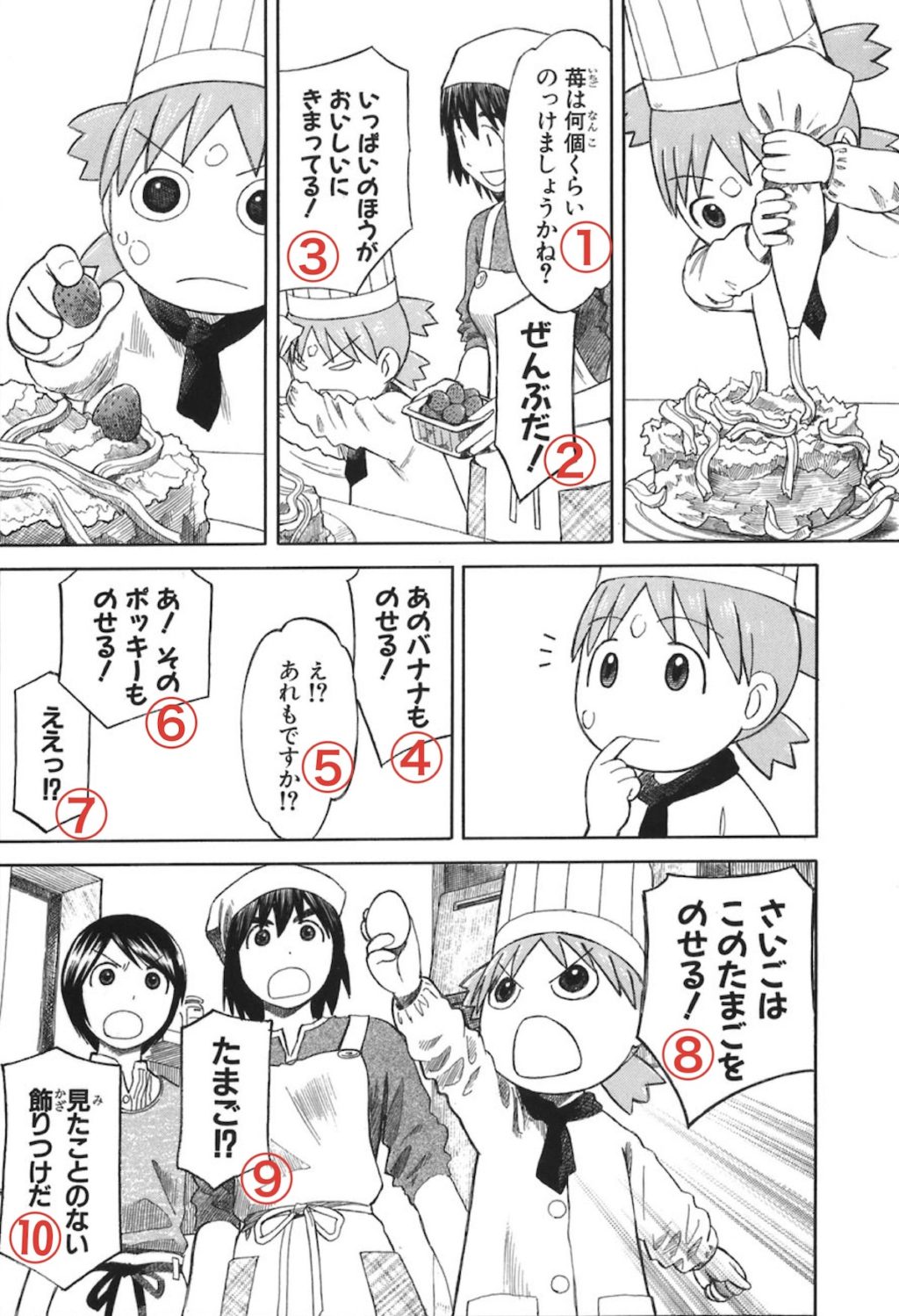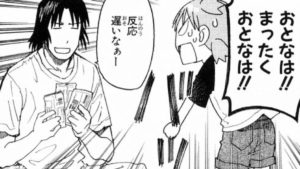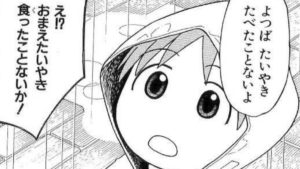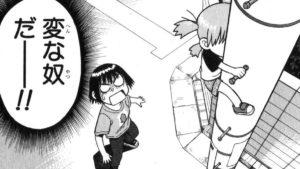Let’s learn Japanese with our analysis of manga. We will analyse a manga snippet from Yotsubato! (よつばと!) Volume 7.
CONTENTS
Manga Snippet
Sentences
Mouseover (tap on a smartphone/tablet) to reveal the censored romaji and English translation.
-
苺は何個くらいのっけましょうかね?
ichigo wa nanko kurai nokkemashō ka ne?
About how many strawberries shall we put on? -
ぜんぶだ!
zenbu da!
All of them! -
いっぱいのほうがおいしいにきまってる!
ippai no hō ga oishii ni kimatteru!
With that many it ought to be delicious! -
あのバナナものせる!
ano banana mo noseru!
I’ll put on that banana too! -
え!?あれもですか!?
e!? are mo desu ka?
What!? That too!? -
あ!そのポッキーものせる!
a! sono pokkī mo noseru!
Oh! I’ll put on that pocky too! -
ええっ!?
ee!?
Eeh!? -
さいごはこのたまごをのせる!
saigo wa kono tamago o noseru!
Finally, I’ll put on this egg! -
たまご!?
tamago!?
An egg!? -
見たことのない飾りつけだ!
mita koto no nai kazaritsuke da!
I’ve never seen this sort of decoration before!
Analysis of Manga
-
「苺は何個くらいのっけましょうかね?」
- 苺 (noun) – strawberry
- は (particle) – indicates sentence topic
- 何個 (noun) – how many
- くらい (particle) – approximately, about
- のっけ (verb stem) – put on (broken version of “のせ”る)
- ましょうか (grammar) – used to make a suggestion politely; shall I/we …? EXAMPLES
- ね (particle) – indicates request for confirmation/agreement/response
-
「ぜんぶだ!」
- ぜんぶ (noun) – all
- だ (auxiliary) – makes a sentence declarative (attached to a noun or na-adjective)
-
「いっぱいのほうがおいしいにきまってる!」
-
「あのバナナものせる!」
- あの (adjective) – that
- バナナ (noun) – banana
- も (particle) – too, also
- のせる (verb) – put on
-
「え!?あれもですか!?」
- え!? (interjection) – huh?!, eh?!
- あれ (noun) – that one
- も (particle) – too, also
- です (auxiliary) – make a sentence polite (attached to a noun or i/na-adjective)
- か (particle) – indicates question
-
「あ!そのポッキーものせる!」
- あ! (interjection) – oh!
- その (adjective) – that
- ポッキー (noun) – Pocky (name of the popular snack in Japan)
- も (particle) – too, also
- のせる (verb) – put on
-
「ええっ!?」
- ええっ (interjection) – huh?!, eh?!
-
「さいごはこのたまごをのせる!」
- さいご (noun) – last
- は (particle) – indicates sentence topic
- この (adjective) – this
- たまご (noun) – egg
- を (particle) – indicates direct object of action
- のせる (verb) – put on
-
「たまご!?」
- たまご (noun) – egg
-
「見たことのない飾りつけだ!」
- 見た (verb ta-form) – look, see
- ことのない (grammar) – have never done before EXAMPLES
- 飾りつけ (noun) – decoration
- だ (auxiliary) – makes a sentence declarative (attached to a noun or na-adjective)
Examples
Verb + ましょうか (shall I/we …?)
もう遅いし、そろそろ行きましょうか。
mō osoi shi, sorosoro ikimashō ka.
Since it’s already late, shall we go soon?
荷物重そうですね。持ちましょうか。
nimotsu omosō desu ne. mochimashō ka.
Your luggage looks heavy. Shall I hold it?
Without か, it means “let’s” or “I shall” (polite).
- そろそろ行きましょう。(Let’s go soon)
- 荷物、持ちましょう。(I shall hold the luggage)
方が (something is more …)
noun + の方が
スカートの方が似合うよ!
sukāto no hō ga niau yo!
You look better in skirts!
一人の方が気楽で好き。
hitori no hō ga kiraku de suki.
I like being single because it is more free.
verb + 方が
髪をあげた方がかわいいと思うよ。
kami o ageta hō ga kawaii to omou yo.
I think you look cuter with your hair up.
i-adjective + 方が
家は駅から近い方がいいです。
ie wa eki kara chikai hō ga ii desu.
I prefer that the house is close to the station.
na-adjective + な方が
魚は新鮮な方がおいしい。
sakana wa sinsen na hō ga oishii.
Fresh fish is more delicious.
Plain Form + に決まってる (no doubt, of course)
明日世界が終わるなんて、嘘に決まってる!
ashita sekai ga owaru nante, uso ni kimatteru!
It’s obviously a lie that the world ends tomorrow!
毎日頑張って勉強したんだから、合格するに決まってる。
mainichi ganbatte benkyō shitanda kara, gōkaku suru ni kimatteru.
You studied very hard everyday. Of course you’ll pass the exam.
Verb Ta-Form + ことのない (have never done before)
今まで行ったことのない国へ行きたい。
imamade itta koto no nai kuni e ikitai.
I want to go to countries where I have never been before.
一度も話したことのないクラスメートが話しかけてきた。
ichido mo hanashita koto no nai kurasumēto ga hanashikakete kita.
A classmate who I’ve never spoken to talked to me.
When it modifies the following noun, either の or が can be used.
There is a world you have never seen before in space.
- ✔︎宇宙には誰も見たことのない世界がある。
- ✔︎宇宙には誰も見たことがない世界がある。
But when it is used as a predicate of a sentence, only が can be used.
I have never eaten such food before.
- ✖︎こんな食べ物は食べたことのない。
- ✔︎こんな食べ物は食べたことがない。
In casual speech, particles are often removed (e.g. 見たことない, 食べたことない).
Support Easy Peasy Japanesey
If you enjoy our content, please consider supporting Easy Peasy Japanesey. Your support will help keep us going. Thank you for your support!




thanks for the useful contents
You’re welcome 🙂